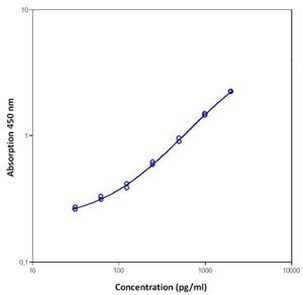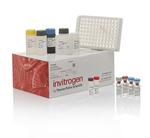Search Thermo Fisher Scientific
Product Specifications
Analytical sensitivity
Assay range
Sample type/volume
Hands-on time
Time-to-result
Homogenous (no wash)
Interassay CV
Intraassay CV
Instrument
Product size
Contents
Standard
Sample Diluent
Assay Buffer concentrate
Biotinylated Detection Antibody
SAV-HRP
Wash Buffer
Chromogen
Stop Solution
Adhesive Plate Covers
Shipping conditions
Storage
Protein name
Species (tested)
Assay kit format
Detector antibody conjugate
Label or dye
About This Kit
The Mouse Interleukin-27 (Ms IL-27) ELISA quantitates Ms IL-27 in mouse serum, plasma, buffered solution, or cell culture medium. The assay will exclusively recognize both natural and recombinant Ms IL-27.
Principle of the method
The Mouse IL-27 solid-phase sandwich ELISA (enzyme-linked immunosorbent assay) is designed to measure the amount of the target bound between a matched antibody pair. A target-specific antibody has been pre-coated in the wells of the supplied microplate. Samples, standards, or controls are then added into these wells and bind to the immobilized (capture) antibody. The sandwich is formed by the addition of the second (detector) antibody, a substrate solution is added that reacts with the enzyme-antibody-target complex to produce measurable signal. The intensity of this signal is directly proportional to the concentration of target present in the original specimen.
Rigorous validation
Each manufactured lot of this ELISA kit is quality tested for criteria such as sensitivity, specificity, precision, and lot-to-lot consistency. See manual for more information on validation.
IL-27, a member of the IL-12 family, is a heterodimeric protein consisting of the p40-related protein Epstein-Barr virus-induced gene 3 (EBI3) non-covalently linked to an IL-12p35-related protein, p28 (also known as IL-30). IL-27 is produced by activated APCs and mature dendritic cells. IL-27 exerts its activities on NK cells and naive CD4+ T cells; mRNA expression analysis of IL-27 receptor components (WSX-1/TCCR and gp130) suggests that IL-27 may also target other cells, including mast cells and monocytes. Binding of IL-27 to WSX-1/gp130 activates JAK1, STAT1, and STAT3 and STAT1/3 phosphorylation. WSX-1/TCCR-deficient mice develop impaired Th1 responses and are more susceptible to infection with L. monocytogenes suggesting that Th1 responses require IL-27. Although activation of WSX-1 is required for the initiation of Th1 responses, it is not necessary for maintaining Th1 responses. IL-27 alone is not able to induce the differentiation of CD4+ T cells into IFN-γ-producing cells, suggesting a role for IL-27 as an initial activator of Th1 responses. An important effect of IL-27 in initiating Th1 responses is the induction of the Th1-specific transcription factor T-bet as well as the suppression of the Th2-specific transcription factor GATA-3. T-bet plays a critical role in Th1 differentiation by its ability to maintain IL-12Rβ2 expression following CD4+ T cell activation. Recent studies indicate that IL-27 has a potent antitumor activity. In vitro, IL-27 has been found to act directly on naive CD8 cells, generating CTL with enhanced granzyme B expression. In vivo, IL-27 has been reported to augment CTL activity, inhibit tumor growth, and induce complete regression of primary and metastatic neuroblastoma tumors.
For Research Use Only. Not for use in diagnostic procedures. Not for resale without express authorization.
References (0)
Bioinformatics
Gene aliases : IL-27, IL-27p28, Il27, Il27a, Il30, p28
Gene ID : (Mouse) 246779
Gene symbol : Il27
Protein Aliases : IL-27 p28 subunit, IL-27 subunit alpha, IL-27-A, IL27-A, p28, interleukin 30, Interleukin-27 subunit alpha
UniProt ID (Mouse) Q8K3I6

Performance Guarantee
If an Invitrogen™ antibody doesn't perform as described on our website or datasheet,we'll replace the product at no cost to you, or provide you with a credit for a future purchase.*
Learn more
We're here to help
Get expert recommendations for common problems or connect directly with an on staff expert for technical assistance related to applications, equipment and general product use.
Contact tech support


